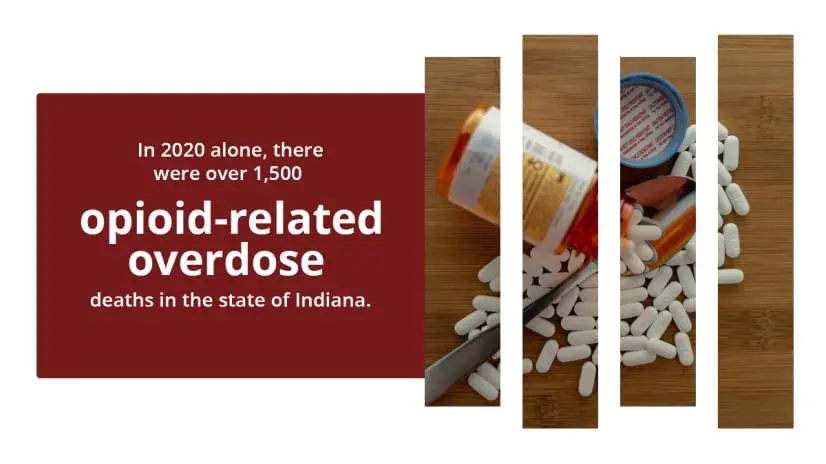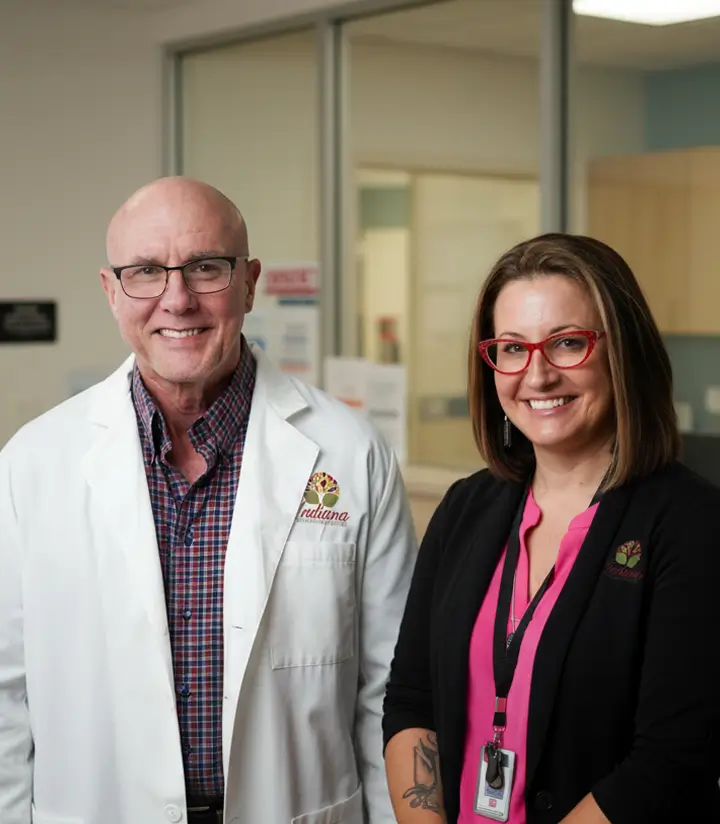
Opioid Overdose In Indiana
Clinically Reviewed by:
The opioid crisis in Indiana has profoundly impacted individuals, families, and communities across the state. The crisis has led to a surge in overdose deaths and strained healthcare and law enforcement resources, rooted in factors like overprescription, lack of access to treatment, and societal stigma.
Efforts to combat the crisis involve increased access to addiction treatment, prescription monitoring programs, and community education initiatives. Addressing the opioid crisis requires a multi-faceted approach involving healthcare providers, policymakers, and the public.

Key Takeaways
The Indiana opioid crisis involves widespread misuse and addiction. Here is what you need to know:
- Indiana continues to grapple with the devastating effects of the opioid crisis.
- The stigma surrounding opioid addiction can prevent individuals from seeking help, exacerbating the crisis.
- Prevention efforts focus on reducing drug overdoses, addressing opioid use disorder, and educating communities about the risks of opioid and illicit drug use.
Indiana Center for Recovery offers compassionate care and comprehensive support for individuals battling addiction.
Opioids In Indiana
Indiana continues to grapple with the devastating effects of the opioid crisis. Overdose deaths remain alarmingly high, with opioids accounting for a significant portion of drug-related fatalities.
Communities across the state are witnessing the profound impacts of addiction, including strained healthcare systems and increased crime rates. Efforts to combat the crisis are underway, but significant challenges persist in accessing treatment and addressing the root causes of opioid misuse.
Historical Overview
The opioid crisis in Indiana emerged in the late 1990s when pharmaceutical companies aggressively marketed prescription opioids as safe and effective pain management solutions. Consequently, the state saw a surge in opioid prescriptions, leading to widespread misuse and addiction.
Heroin and illicitly manufactured fentanyl further exacerbated the crisis, contributing to a sharp increase in overdose deaths. Despite legislative efforts to curb opioid prescribing practices and expand access to addiction treatment, Indiana continues to grapple with the far-reaching consequences of this public health emergency.
Indiana Opioid Use Statistics
The severity of the opioid crisis in Indiana is reflected in various sources and statistics. According to data from the Indiana State Department of Health, opioid overdose deaths have been steadily rising, reaching alarming levels in recent years. In 2020 alone, there were over 1,500 opioid-related overdose deaths in the state. Additionally, prescription opioid misuse remains a significant concern, with Indiana ranking among the top states for high-dose opioid prescriptions.
Furthermore, the proliferation of illicit opioids like heroin and fentanyl has contributed to the crisis. Law enforcement agencies report increasing seizures of these dangerous substances across the state.
Emergency department visits related to opioid overdoses have also surged, straining healthcare resources. These statistics stress the urgent need for comprehensive strategies to address the opioid crisis, including expanding access to naloxone, a medicine used to reverse opioid overdoses, and implementing evidence-based prevention and treatment programs.
Combating the crisis requires collaboration among healthcare providers, policymakers, law enforcement agencies, and community organizations. These can all help mitigate its devastating impact on individuals and communities throughout Indiana.
Effects of the Opioid Crisis In Indiana
The opioid crisis in Indiana has far-reaching effects on individuals, families, and communities. One significant impact is the rise in overdose deaths, leading to loss and grief for many families. Additionally, the crisis strains healthcare systems as hospitals and emergency departments handle a surge in opioid-related admissions.
Communities bear the burden of increased crime rates associated with opioid misuse, including theft and drug trafficking. Moreover, the workforce sees a decline in productivity as addiction interferes with employment.
The stigma surrounding opioid addiction can prevent individuals from seeking help, exacerbating the crisis. Overall, the opioid crisis has profound social and economic consequences, requiring comprehensive strategies to address its effects and support those affected. Collaboration among various stakeholders is crucial to mitigate the impact and create a healthier future for all residents of Indiana.
Indiana’s Response to the Opioid Crisis
Indiana has implemented various strategies to combat the opioid crisis effectively. One approach involves expanding access to naloxone, a medication that can reverse opioid overdoses, to first responders and community members. Additionally, the state has enhanced its prescription drug monitoring program to track opioid prescriptions and prevent misuse.
Furthermore, Indiana has increased funding for addiction treatment and recovery support services, including medication-assisted treatment programs. Education and prevention efforts target both healthcare providers and the general public to raise awareness about the risks of opioid misuse and the essence of safe prescribing practices.
Law enforcement agencies also play an integral role in addressing the crisis by cracking down on illicit opioid trafficking and supporting diversion programs for individuals struggling with addiction.
Moreover, Indiana has implemented harm reduction initiatives, like syringe exchange programs, to reduce the spread of infectious diseases among people who inject drugs.
Overall, Indiana’s response to the opioid crisis involves a comprehensive approach that addresses prevention, treatment, harm reduction, and law enforcement efforts to combat this complex public health emergency.
Frequently Asked Questions (FAQ)
What is the addiction rate in Indiana?
In Indiana, the addiction rate is about 8.2 percent among adults aged 18 and older. It means roughly 1 in 12 adults struggle with addiction. Commonly abused substances are alcohol, opioids, and methamphetamine.
Addiction can lead to various health problems, strained relationships, and financial difficulties. Seeking help from experts and support groups can aid in recovery. Efforts in prevention, education, and treatment are crucial to addressing addiction effectively in the state and across the country.
What resources are available for individuals struggling with opioid addiction in Indiana?
Indiana Center for Recovery offers inpatient and outpatient addiction treatment, serving communities throughout Indiana. Our programs utilize a holistic approach to treatment, meaning we treat you as a person, not an addiction. Our comprehensive care includes detox, individual and group therapy, and family programs.
Get Help for Opioid Addiction in Indiana
The opioid crisis in Indiana has devastated communities across the state, with over 1,500 opioid-related overdose deaths in 2020 alone. If you or someone you love is struggling with opioid addiction, professional treatment can help prevent overdose and support lasting recovery. At Indiana Center for Recovery, we understand the urgency of addressing opioid addiction and are here to provide comprehensive, evidence-based treatment.
Our specialized addiction treatment programs for opioid use disorder begin with medically supervised medical detox programs to safely manage withdrawal symptoms and reduce the risk of overdose. Following detox, our residential treatment program provides intensive support in a structured environment, while our outpatient treatment services offer ongoing care and medication-assisted treatment options for those maintaining daily responsibilities.
Recovery from opioid addiction is possible with the right support and professional treatment. We offer treatment centers across Indiana where you can access comprehensive opioid addiction treatment programs designed to help you achieve lasting recovery and reduce the risk of overdose. Call us today at (844) 650-0064 to learn more about our evidence-based opioid treatment options and take the first step toward a healthier, substance-free life.






 100% Confidential
100% Confidential
